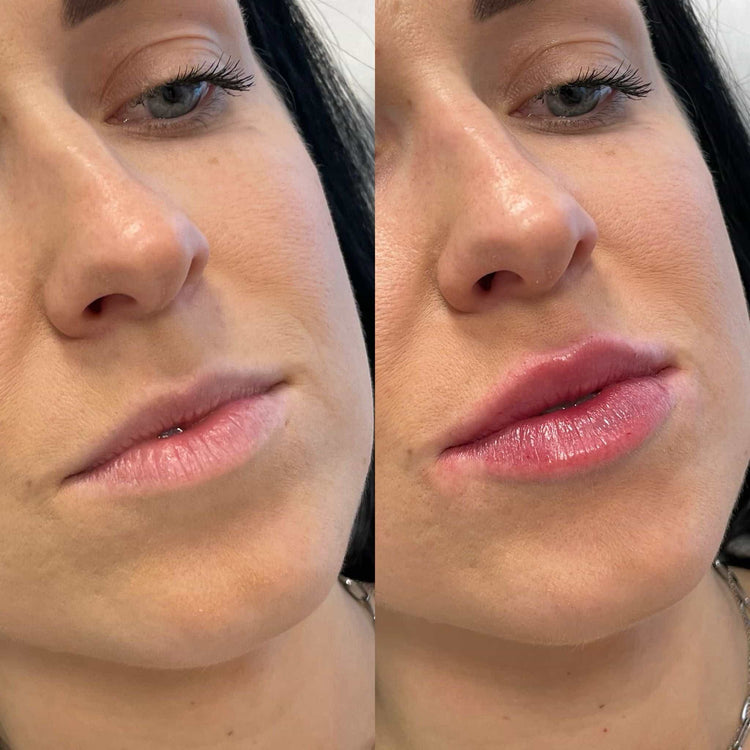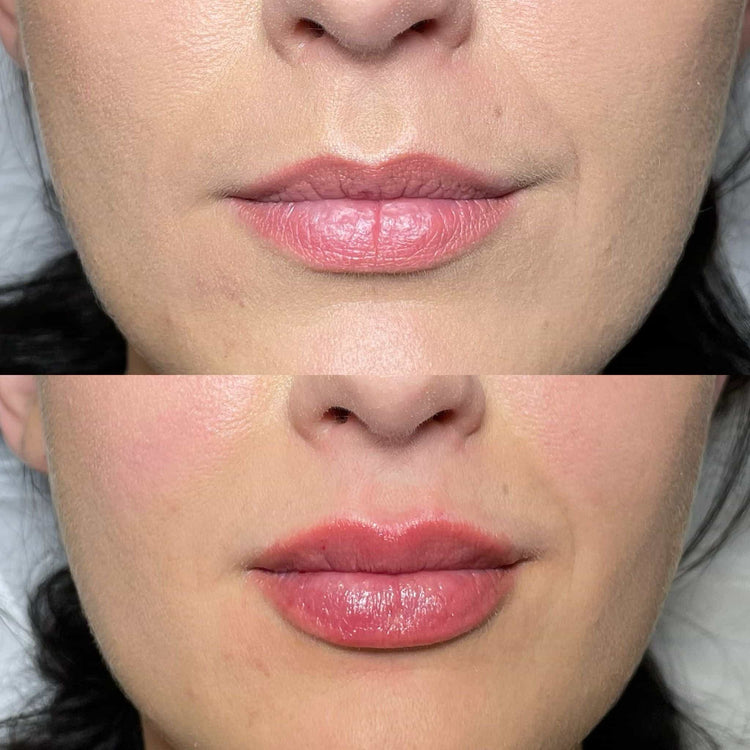Understanding the Procedure
Understanding the procedure involved in achieving pain-free lip filler results is crucial before embarking on this popular cosmetic enhancement journey in the UK.
Types of Fillers
Pain-free lip fillers utilize local anesthetic to numb the treatment area, minimizing discomfort during the process. The filler itself typically contains hyaluronic acid, a naturally occurring substance in the body that attracts and retains moisture, plumping up the lips.
There are various types of hyaluronic acid fillers available, each with different properties and densities. Some common types include: Juvederm, Restylane, and Belotero. The choice of filler depends on individual needs and desired outcomes, such as subtle enhancement or a more dramatic plumping effect.
Preparation for Treatment
Before undergoing pain-free lip filler treatment, it is important to have a clear understanding of the procedure and necessary preparation steps.

Firstly, consult with a qualified and experienced practitioner who can assess your individual needs and recommend the most suitable type of filler. During the consultation, discuss your desired outcome, medical history, and any allergies you may have.
In the days leading up to the treatment, avoid taking aspirin or ibuprofen as these medications can increase bleeding risk. Additionally, stay well-hydrated and avoid consuming alcohol for 24 hours prior to the procedure.
On the day of the treatment, refrain from wearing makeup around the area being treated. You may also be advised to apply a topical numbing cream before the procedure to further minimize discomfort.
It is important to follow your practitioner’s post-treatment instructions carefully to ensure optimal results and minimize any potential complications.
Finding a Qualified Practitioner
Finding a qualified practitioner is paramount when considering pain-free lip filler in the UK. A skilled professional will have extensive experience with various filler types, ensuring they can tailor the treatment to your individual needs and desired outcome.
Qualifications and Experience
Finding a qualified practitioner is paramount when considering pain-free lip filler in the UK. A skilled professional will have extensive experience with various filler types, ensuring they can tailor the treatment to your individual needs and desired outcome.
Here’s what to look for:
- Qualifications: Ensure the practitioner is a registered medical professional, such as a doctor, nurse practitioner, or dentist with specialized training in facial aesthetics.
- Experience: Inquire about their experience with lip filler treatments, particularly pain-free techniques. Look for practitioners who have performed numerous procedures and can demonstrate positive patient outcomes.
- Credentials and Membership: Check if they are members of reputable professional organizations such as the British Association of Aesthetic Plastic Surgeons (BAAPS) or the Joint Council for Cosmetic Practitioners (JCCP).
- Consultation: A thorough consultation is essential. Discuss your expectations, medical history, and any concerns you may have. A qualified practitioner will listen attentively and provide personalized advice.
Consultation Process
Finding a qualified practitioner is paramount when considering pain-free lip filler in the UK.
A skilled professional will have extensive experience with various filler types, ensuring they can tailor the treatment to your individual needs and desired outcome.
Here’s what to look for:
- Qualifications: Ensure the practitioner is a registered medical professional, such as a doctor, nurse practitioner, or dentist with specialized training in facial aesthetics.
- Experience: Inquire about their experience with lip filler treatments, particularly pain-free techniques. Look for practitioners who have performed numerous procedures and can demonstrate positive patient outcomes.
- Credentials and Membership: Check if they are members of reputable professional organizations such as the British Association of Aesthetic Plastic Surgeons (BAAPS) or the Joint Council for Cosmetic Practitioners (JCCP).
- Consultation: A thorough consultation is essential. Discuss your expectations, medical history, and any concerns you may have. A qualified practitioner will listen attentively and provide personalized advice.
During this consultation, be prepared to discuss your desired outcome in detail, including the shape, volume, and fullness you envision for your lips. The practitioner will assess your facial anatomy and recommend the most suitable filler type and technique based on your individual needs and goals. They will also explain the potential risks and benefits of the procedure, as well as any aftercare instructions.
Potential Risks and Side Effects
While pain-free lip fillers aim to minimize discomfort, it’s essential to understand potential risks and side effects before undergoing the procedure. Like any medical treatment, there are possible complications that can occur, ranging from mild to more serious. These can include swelling, bruising, redness, tenderness, infection, and allergic reactions. In rare cases, there might be issues with filler migration or asymmetry.

Common Side Effects
Potential risks and side effects of lip fillers can vary from person to person and depend on factors such as individual healing abilities and the experience of the practitioner.
Common side effects, which typically resolve within a few days to weeks, include swelling, bruising, redness, tenderness, and itching around the injection sites.
More serious complications are less common but can occur. These may include infection, allergic reactions (such as hives or difficulty breathing), filler migration (where the filler moves to unintended areas), or asymmetry.
Allergic Reactions
It is important to understand potential risks and side effects before undergoing any cosmetic procedure, including pain-free lip fillers. While generally safe, there are some possibilities to be aware of.
Common side effects, like swelling, bruising, redness, tenderness, and itching, usually subside within a few days to weeks.
More serious complications are less frequent but can include infection, allergic reactions (ranging from mild hives to severe breathing difficulties), filler migration (where the filler moves outside the intended area), or asymmetry.
Allergic reactions to hyaluronic acid fillers are possible, although relatively rare. If you have a known allergy to any type of filler component, inform your practitioner immediately.
It is crucial to choose a qualified and experienced practitioner who will assess your individual risk factors and provide guidance on minimizing potential complications.
Infection Risks
While pain-free lip fillers aim to minimize discomfort, it’s essential to understand potential risks and side effects before undergoing the procedure. Like any medical treatment, there are possible complications that can occur, ranging from mild to more serious. These can include swelling, bruising, redness, tenderness, infection, and allergic reactions. In rare cases, there might be issues with filler migration or asymmetry.
Potential risks and side effects of lip fillers can vary from person to person and depend on factors such as individual healing abilities and the experience of the practitioner.
Common side effects, which typically resolve within a few days to weeks, include swelling, bruising, redness, tenderness, and itching around the injection sites.
More serious complications are less common but can occur. These may include infection, allergic reactions (such as hives or difficulty breathing), filler migration (where the filler moves to unintended areas), or asymmetry.
Cost and Aftercare
Understanding the cost involved in pain-free lip fillers and the necessary aftercare is crucial before making a decision. The price of treatment can vary depending on factors like the practitioner’s experience, the amount of filler used, and the location of the clinic. It’s important to discuss pricing openly with your chosen practitioner during the consultation.
Aftercare instructions are vital for achieving optimal results and minimizing potential complications.
Treatment Costs
Treatment costs for pain-free lip fillers can vary depending on a number of factors, such as the experience of the practitioner, the amount of filler used, and the geographical location of the clinic. It’s important to have a transparent conversation about pricing with your chosen practitioner during the consultation process.
Following aftercare instructions carefully is crucial for optimal results and minimizing potential complications. Your practitioner will provide specific guidelines tailored to your treatment, but generally these may include avoiding strenuous activity, applying cold compresses to reduce swelling, keeping the area clean, and refraining from touching or rubbing the treated area.
Aftercare Instructions
Treatment costs for pain-free lip fillers can vary depending on a number of factors, such as the experience of the practitioner, the amount of filler used, and the geographical location of the clinic. It’s important to have a transparent conversation about pricing with your chosen practitioner during the consultation process.
Following aftercare instructions carefully is crucial for optimal results and minimizing potential complications. Your practitioner will provide specific guidelines tailored to your treatment, but generally these may include avoiding strenuous activity, applying cold compresses to reduce swelling, keeping the area clean, and refraining from touching or rubbing the treated area.
Experience the best pain-free lip filler treatments with Dr. Laura Geige at It’s Me & You Clinic.
- Why CBD Gummies Are Gaining Popularity For Stress And Anxiety Management - November 14, 2025
- What Is The Best Laser Treatment For Smokers Lines? - November 11, 2025
- What Are The Benefits Of CBD Infused Gummies - November 9, 2025
